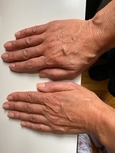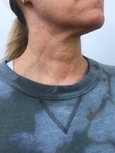Is higher % retinol more effective for anti-aging?
You've likely seen the vast but tight competition in the skincare market. Brands often tout the potency of their formulas, proudly displaying higher and higher percentages of active ingredients. But is a higher concentration of something as highly-sensitizing as retinol really more effective for turning back the clock on aging skin? And do you need to feel that "tingling sensation" to know it's really working?
A higher percentage of retinol is not necessarily better
A study by Griffiths et al. found that tretinoin (a prescription-strength retinoid) at concentrations of 0.1% and 0.025% produced similar clinical and histological improvements in photoaging, despite the 0.1% causing significantly more irritation1.
After 48 weeks, both 0.1% and 0.025% tretinoin resulted in statistically significant epidermal thickening (by 30% and 28% respectively) and increased vascularity (by 100% and 89% respectively) compared to the vehicle1. However, the 0.1% concentration led to notably more redness and scaling.
The fact that clinical improvements were only marginally different between the two concentrations and the lesser strength was achieved without excess irritation suggests that mechanisms other than irritation are responsible for retinoids' ability to repair sun damage1. Sometimes the wait is worth it.
Mass Index Recommends

Soft Services
Theraplush™
$62
1.7 fl oz
fragrance-free
Cushion-coat hands in a soft, waxy layer of nourishing, soothing and repairing ingredients overnight, for a just-manicured feeling each morning.

Soft Services
Software Update
$44
2.5 fl oz
fragrance-free
A lightweight, creamy overnight serum designed to promote surface skin cell renewal with 0.25% retinol. Ideal for addressing both preventative and existing signs of aging.
Does retinol tingling equate to efficacy?
You may associate that old school "active ingredient tingle" motto with efficacy, but it's not a requisite for retinol to work effectively. Once your skin acclimates to using retinoids, a lack of stinging doesn't mean it's not effective—it simply means your skin has adapted to the ingredient and its strength. The retinol is still doing its job in the background, beneath the skin's surface2.
Retinol vs. retinoids: what's the difference?
Retinoid is an umbrella term that encompasses various derivatives of vitamin A, such as retinol. Tretinoin, or retinoic acid, is the most active (and often sensitizing) retinoid only attainable in the US with a doctor's prescription. Retinol, on the other hand, is a gentler derivative that can be found in over-the-counter skincare products like serums and moisturizers.
While retinol is less potent than a prescription retinoid, it can still effectively address the same skin concerns—it'll just take a bit longer to see results. Studies have shown that retinol concentrations ranging from 0.1% to 0.5% can provide anti-aging benefits, with improvements visible after 12 weeks of use3.
References:
Griffiths, C., et al. (1995). Two concentrations of topical tretinoin (retinoic acid) cause similar improvement of photoaging but different degrees of irritation. Archives of Dermatology, 131(9), 1037-1044.
Mukherjee, S., et al. (2006). Retinoids in the treatment of skin aging: an overview of clinical efficacy and safety. Clinical Interventions in Aging, 1(4), 327-348.
Zasada, M., & Budzisz, E. (2019). Retinoids: active molecules influencing skin structure formation in cosmetic and dermatological treatments. Postepy Dermatologii i Alergologii, 36(4), 392-397.
Mature Skin
Mature skin is skin that, with age, develops wrinkles, dryness, and sagging from declining collagen and elastin.
Also Called
Aging skin
Frequently Found On
Neck, chest, hands, arms, and other sun-exposed areas.
Related Concerns
Learn More: Mature Skin


















